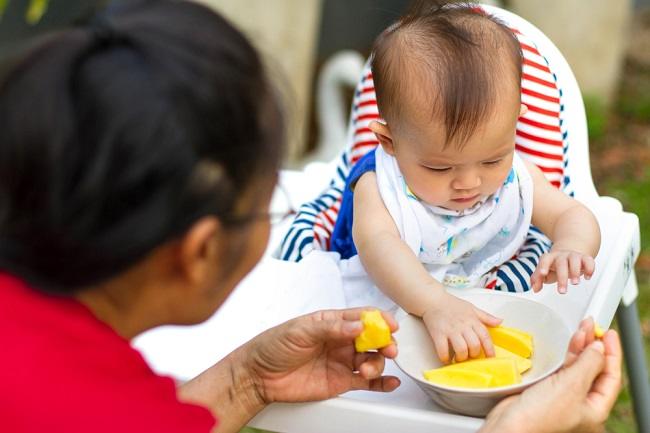The benefits of spinach for babies are very diverse, ranging from healthy eyes to strengthening bones. Therefore, if your little one has started consuming complementary foods or solid foods, you should consider spinach as one of the menus.
When a baby is 6 months old or older, he or she can generally be given complementary foods (MPASI) and introduced slowly to solid foods. At that time, you need to be selective in choosing the food your little one will consume.

There are many types of good food for Mother to give to Little One. One of them is spinach. Besides being easy to process and inexpensive, spinach has a variety of nutrients that are very useful to help baby grow and develop.
Variety of Nutrients Contained in Spinach
Spinach is famous for its abundant fiber content. In a serving of spinach for babies or the equivalent of about 30-50 grams of spinach, there are about 0.7-1 grams of fiber. This figure is equivalent to 8-9% of the daily fiber needs of infants aged 1 year and under.
However, the benefits of spinach for babies not only come from the fiber. There are still a number of other important nutrients that are also widely contained in spinach. The following is a variety of nutrients and the amount contained in every 50 grams of spinach:
- Protein: 1–1.2 grams
- Carbohydrates: 1.5–2 grams
- Folate: 65–90 mcg (micrograms)
- Vitamin A: 200–250 mcg
- Vitamin K: 200–230 mcg
- Vitamin C: 8.5–10 mg (milligrams)
- Calcium: 30 mg
- Iron: 0.8–0.9 mg
- Potassium: 170–200 mg
- Sodium: 30–35 mg
- Magnesium: 30–35 mg
- Phosphorus: 15-20 mg
In addition to the above nutrients, spinach also contains zinc, selenium, vitamin E, as well as antioxidants, such as lutein and zeaxanthin. Because of these various nutrients, the benefits of spinach for babies do not need to be doubted.
Some Benefits of Spinach for Babies
If consumed in the right portion, there are many benefits of spinach for babies that can be obtained, including:
1. Healthy eyes
Thanks to its abundant content of lutein, zeaxanthin, and vitamin A, spinach can maintain baby's eye health and prevent eye damage from sun exposure.
Not only that, a number of studies have even found that the content of vitamin A, lutein, and zeaxanthin is also good for sharpening vision in babies.
2. Counteract the effects of free radicals
Free radicals can come from various sources, ranging from the body's metabolic waste substances to exposure to pollution, for example from vehicle or cigarette smoke.
If exposed to free radicals in large quantities, babies can experience various health problems, such as respiratory problems, developmental disorders, and allergies.
To prevent the bad effects of free radicals, you can give your little one foods that are rich in antioxidants. Luckily, spinach contains lots of antioxidants like vitamin C, lutein, and beta carotene. This content makes spinach good for consumption to maintain the health of the baby.
3. Increase endurance
Vitamin C in spinach is not only able to counteract the effects of free radicals, but also strengthens the baby's immune system.
In the baby's body, vitamin C is responsible for increasing the production as well as the effectiveness of white blood cells that play a role in fighting germs, viruses, and parasites that cause infection or other harmful substances. Thus, the baby is not susceptible to disease.
Moreover, a number of studies have found that vitamin C can also speed up wound healing and make children recover faster when they have a cold or cough.
4. Prevent anemia
If your little one is experiencing hair loss, it could be caused by a lack of iron and folate. Lack of these two nutrients can cause anemia. This can make the baby look limp and the hair will fall out more.
The body needs folate and iron to produce red blood cells. In addition, folate also plays a role in stimulating hair formation. When the number of red blood cells decreases, the amount of oxygen carried to the hair cells decreases. This can cause the baby's hair to fall out.
Spinach is a type of food sourced from plants with high iron and folate content. Therefore, by regularly giving him spinach, you can prevent your little one from anemia and hair loss.
5. Accelerate wound recovery
Babies are very susceptible to injury, for example from crawling on rough floors or falling. This is common in infants and is very difficult to completely prevent.
Routinely giving spinach will help the baby when he has an injury. The reason is, the abundant vitamin K content in spinach plays a role in the blood clotting process so that it makes wounds heal faster.
6. Make bones stronger
Milk is not the only food that can strengthen bones because of its abundant calcium content. The reason, calcium can also be obtained in large quantities from spinach. Nearly 40% of a baby's daily calcium needs are met only by consuming about 50-60 grams of spinach.
7. Smooth the performance of the baby's digestive system
In addition to the various benefits above, spinach is also useful for smoothing the baby's digestion because it contains high fiber. With adequate fiber intake, the baby will be prevented from constipation. Fiber intake from spinach or other fruits and vegetables is also important to support the health of the baby's digestive system.
Because it contains many nutrients, there are also many benefits of spinach for babies. If your little one refuses to eat spinach when it's first given, don't be discouraged. Try to give him more spinach the next few days or try turning the spinach into other foods, such as porridge or puree.
If your little one still doesn't want to eat spinach or it's hard to eat so that it makes it hard for him to gain weight, you can consult a pediatrician for advice on how to give your little one solid food and increase his appetite.









